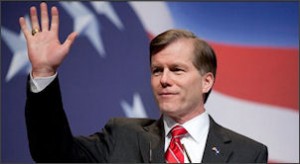by James A. Bacon
Governor Bob McDonnell’s four-year term in office is drawing to a close. Sadly, it appears that the governor will be remembered mainly for his atrocious judgment in accepting more than $150,000 in gifts and loans from a Richmond businessman. While the Giftgate scandal deservedly dominated the headlines in his last year or more in office, it obscured the many accomplishments, mostly positive, of his administration.
I’ll let others re-hash Giftgate, if they are so inclined. I’ll focus instead on McDonnell’s legislative and administrative track record. With one very big exception — restructuring taxes to raise more money for transportation and pushing mega-projects of dubious merit — he did well. Perhaps his most unsung achievement, despite his reputation as a cultural conservative, was governing as a pragmatist. While there was no ducking the culture wars entirely during his tenure, he downplayed them.
McDonnell focused on pocketbook issues. He kept a tight lid on General Fund spending. He reduced unfunded liabilities $9 billion by restructuring state pensions from a defined-defined benefit program to a hybrid, defined-contribution program. He enacted sweeping reforms of the K-12 educational system. He did more to restore the civil rights of felons than any governor in state history, and his policies drove down the recidivism rate to the second lowest in the country. He invested heavily in environmental clean-up. Finally, he demanded significant reforms to the state Medicaid program before approving expansion of that program under the Affordable Care Act.
For whatever reason, most of these accomplishments garnered little attention. Virginia’s truncated press corps and shrunken editorial hole simply doesn’t allow for the kind of journalistic coverage the issues warrant.
I won’t dwell on the abominable transportation-funding package, which shredded any vestige of the user-pays principle in order to transfer wealth to drivers from non-drivers. And I’ll omit any commentary about the Charlottesville Bypass and the Bi-County Parkway, ill-conceived projects by any measure, and the U.S. 460 connector, a speculative economic development project coupled with Hampton Roads port expansion. Regular readers know that I am no fan of McDonnell’s transportation policy.
Upon entering office in 2010, McDonnell inherited a horrendous budgetary dilemma from his predecessor Tim Kaine. Rather than increase taxes, as Kaine had proposed, McDonnell reined in spending and resorted to a series of budgetary gimmicks — short-changing VRS contributions, accelerating tax collections on retailers — that he has mostly wound down. Since then, he has done a reasonable job of allocating resources within tight General Fund budgetary constraints. He had critics on the left who charge that he has not spent enough on education, mental health, Medicaid expansion, whatever. But those voices will never be satisfied. For the most part, he stood on the side of the taxpayers.
McDonnell has done a commendable job on the environmental front, investing $430 million in water-treatment and combined-sewer-overflow projects and reducing pollution runoff from agricultural and urban areas. Water quality in the Chesapeake Bay, still lamentably bad, turned the corner; oyster and blue crab populations rebounded. The Old Dominion posted a record number of clean air days in 2013. Under McDonnell, Virginia was the first state in the country to convert its vehicle fleet from gasoline to natural gas. And here’s a story you probably never heard: Virginia re-established its native elk herd population in Buchanan County; the goal is to reach 400 animals.
The governor’s most unheralded reforms came in education. Virginia increased the percentage of educational money going into the classroom from 61% to 64% of budgeted resources. The state doubled the number of K-12 STEM academies, enacted scholarship tax credits to facilitate school choice for poor families, established a transparent A-F grading system for schools and set up a failing-school takeover program. McDonnell also effectively eliminated teacher tenure and streamlined the grievance procedure.
The administration did a competent, if not inspired, job on the economic front. Despite sequestration and a slowdown of the federal-spending growth engine, Virginia added 193,000 net new jobs and unemployment fell 1.8 percentage points to 5.6% over his four years in office. Although McDonnell made job-creation a clear priority, he was satisfied to work largely within the antiquated institutional framework — agriculture, tourism, corporate recruitment, overseas trade missions — that has been in place for decades. He did push long-term reforms in workforce preparation, steering funding to programs in the Science, Technology, Engineering and Math (STEM) disciplines. And, using innovative public-private partnerships, he allocated billions of dollars to relieving transportation bottlenecks for Virginia’s ports in Hampton Roads. Less successfully, he tried to open up transportation access to the air cargo sector at Washington Dulles International Airport. McDonnell did very little to support smart growth; indeed, the administration back-pedaled on reforms implemented by the Kaine administration.
All in all, McDonnell will be remembered for his tweaks to existing priorities and institutions. One big reform — setting up the Office of Transportation Public Private Partnerships — likely will lead to innovative financing arrangements for all manner of projects, from toll roads to air rights over rail lines and interstates, from privatizing operation of the state’s traffic management centers to leasing out public right-of-way to cell-phone towers. Otherwise, the record has been one of cautious, incremental reform. In the final analysis, McDonnell will leave the state somewhat better than he found it but he did little to increase its long-term competitiveness as a place to live and do business.



